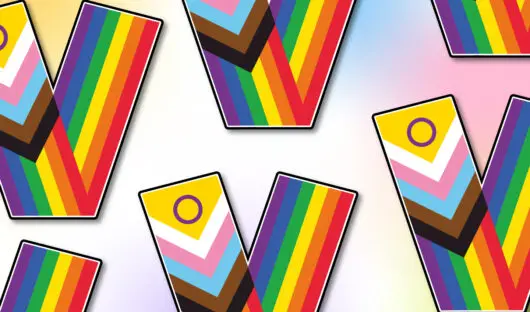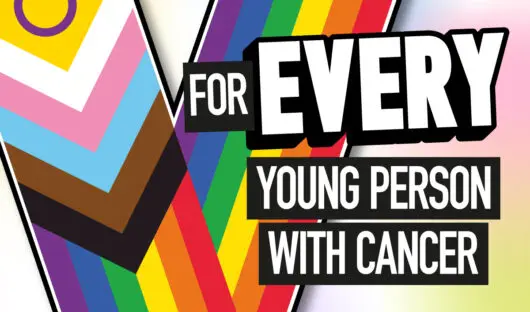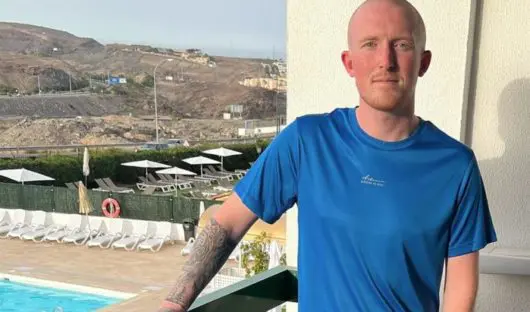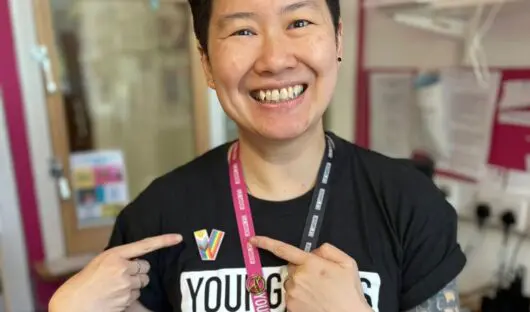Why Pride matters for young people with cancer
This Pride month we’re raising awareness of the unique challenges that sometimes come with being a LGBTQIA+ young person with cancer.
Our Young Lives vs Cancer Specialist Social Workers see these challenges every day, working in hospitals to make sure young cancer patients and their families get the support they need throughout treatment.
Recently, we sat down with one of our specialist social workers to talk about what these challenges look like day to day and how they support LGBTQIA+ young people with cancer.
*Please note the content in this blog involves mentions of negative experiences of LGBTQIA+ young people with cancer which some individuals may find upsetting and distressing.*
At Young Lives vs Cancer, we talk about how the LGBTQIA+ young people and families we support face unique challenges. Can you talk a bit about what these challenges are?
In the medical world things can be very black and white, very old-school. The environment and attitudes can be quite behind what we’re all used to in our everyday lives. And for the young people with cancer we’re supporting, this sometimes affects how their physical health is treated, which is shocking. But these attitudes can also damage a LGBTQIA+ young person’s mental health, and the effects can be lasting on that young person.
How does being a LGBTQIA+ young person with cancer change the way you’re treated? What can that look like?
One young woman I supported told me that she was worried about the effects of her cancer treatment on her fertility. I was astonished this hadn’t been explained or her options discussed with her already, as this should be a common medical conversation. So, I went and spoke to the doctor to find out why this had been missed. I was told they hadn’t felt the need to discuss fertility options with the young woman as her partner was also a woman. They didn’t even consider that she would want to have children. But she did.
For some LGBTQIA+ young people, they’ll never know they’re being treated differently to other patients. But we know. We see it and it’s our job as Young Lives vs Cancer Specialist Social Workers to advocate for those young people. To make sure these conversations happen. And fortunately, it did for that young woman after that.
For other young people, the attitudes towards them can be very visible and loud. For example, with transgender patients there’s often misgendering or misunderstandings about how the young person wants to be spoken to or about.
They hadn’t discussed fertility options with the young woman as her partner was also a woman. They didn’t even consider that she would want to have children. But she did.
How do these attitudes affect the young people you support?
I supported a young person who had been living as a male for many years but was biologically female. During his treatment in the hospital, he was repeatedly misgendered and referred to as ‘she’. He would try to correct medical staff when they made a mistake, but they would just make jokes about him. It was belittling. They also didn’t take the time to understand his issues with dysphoria or why he was uncomfortable with undressing.
This young person had been living as a male for many years. He had come to accept himself in that time. But the hospital experience brought up old insecurities and issues that he thought he’d already worked through. The hospital was an unsafe environment for him, and it all came flooding back. He became very low and very anxious. When he shared this with me, I went straight to the hospital to discuss their unacceptable behaviour. But the damage was done, and it took us a long time to break down those walls with him after that.
It’s heart-breaking to see the effect this has on young cancer patients. We all have things that make us feel who we are and sometimes that gets stripped away in medicine. It’s important we, as social workers, advocate for these things for young people to protect their mental health through an already awful time. It’s important that we care about what matters to them.
How common is it for you to be supporting young people with these challenges?
When we have LGBTQIA+ young people in our care, we’ll be dealing with these challenges every day. They’re not an uncommon thing. As a social care team, we’ll be discussing how to address these problems for young people all the time.
During his treatment he was repeatedly misgendered. He would try to correct them but they would just make jokes about him. It was belittling.
How does it feel to see LGBTQIA+ young people with cancer facing these kind of issues?
It’s really upsetting. The young person will be dealing with these things while already coping with a cancer diagnosis. It’s already so hard and scary for them as it is. The hospital needs to be a safe space. And we need to make them feel safe.
How do you try to create safe spaces for the LGBTQIA+ community you help?
As social workers, it’s important to let young people know we’re happy to discuss whatever’s important to them and show that we’re allies. We do our best to make them feel as comfortable as possible, like by asking their pronouns and trying to encourage open conversations.
We wear our Young Lives vs Cancer Pride badge too. When young people see the badges, they know we’re a safe person. The same goes for parents, carers or siblings that we also support. It symbolises we’re someone they can trust to have honest conversations with, no matter what they’re worried about. We want them to know there’s nothing that they can say or do that’s going to be so shocking that it would change the way we work with them. Whatever the problem is we can figure it out with no judgement.
The world of medicine can seem daunting, so we want them to know they can talk to us about their worries and rely on us for support. And when we see unacceptable behaviour towards them, we address it and advocate for them when they need us to.
It really makes such a difference to do these things. I once supported a young person who, at first, didn’t feel comfortable sharing they used they/them pronouns. But I worked with them and got to a point where they felt comfortable to share that. With their permission, I discussed it with the ward and let medical staff know that’s how they should refer to them from now on too. There was a big change for the young person after that, they seemed so much happier as they were able to be their true self.
The world of medicine can seem daunting, so we want them to know they can talk to us about their worries and rely on us.
What would you like to see change for LGBTQIA+ young people with cancer and families?
It’s disappointing and damaging to young people when professionals aren’t educated on the LGBTQIA+ community. But even just to be able to acknowledge when you make a mistake and correct yourself makes a huge difference to these young people who are already going through so much. I would ask that that anyone put themselves in that young person’s shoes. Think how your actions or what you say would make you feel in that position. We’re here to support all young cancer patients and deliver the best care to everyone, and that includes those from the LGBTQIA+ community too.
Support for LGBTQIA+ young people with cancer
Information on the extra challenges you might face as an LGBTQIA+ person with cancer, plus support resources to help.
Find out more
Our Pride Promise
We exist so no young person has to face cancer alone, which includes LGBTQIA+ young people and their families.
Read our Pride Promise
Posted on Monday 24 June 2024

